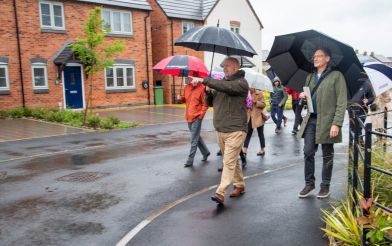Affordable housing celebrated

Blaby District Council colleagues were among partners celebrating the completion of new affordable homes in Whetstone.
They joined representatives from emh group, Homes England and Lovell to mark the opening of The Villers.
The Villers is an affordable housing development, built on a former brownfield site and providing a range of high-quality family housing, dementia-friendly bungalows and supported living for people with a variety of complex needs.
Delivered by emh group as part of its Strategic Partnership agreement with Homes England, The Villers features 77 properties with a split of social rent and shared ownership tenures.
Blaby District Council worked closely with emh to ensure the development met critical local housing needs and helped to ease pressure on the need for temporary housing.
Ian Jones, Housing Services Manager for Blaby District Council, said: "It is so satisfying to see this development completed. Thanks to our partnership with emh Group and Homes England we now have a range of modern and much-needed affordable new homes in Blaby District. This will enable more people to get on the property ladder as well as access homes at an affordable rent."
Chan Kataria, Group Chief Executive at emh said: "I’m delighted we were able to come together with our partners to celebrate the completion of this fantastic scheme. Through our strong partnership with Blaby District Council, we have delivered homes that meet the needs of local people, helping them to achieve their housing aspirations. I’m proud we have been able to work with our partners to achieve emh’s ambition of building high-quality homes for thriving communities."
The Villers has seen a high level of demand, particularly for the shared ownership homes which had over 500 people interested in the 39 available homes. All new residents come from the local area, helping them to stay connected to schools, family, friends and support networks.
The Villers is built on land which until recently consisted of derelict industrial buildings and overgrown vegetation. The site has historical significance, being the former home of the Whittle Estate, developed by Air Commodore Sir Frank Whittle and later an important centre for the nuclear industry and computer research. The site also incorporates part of the embankment of the disused Great Central Railway.
The site has a sense of openness, with homes addressing a soft landscaped area centred around a pond creating a ‘village green’ feel. The connection to open green space is further enhanced through the integration of the wildlife corridor along the former railway line.